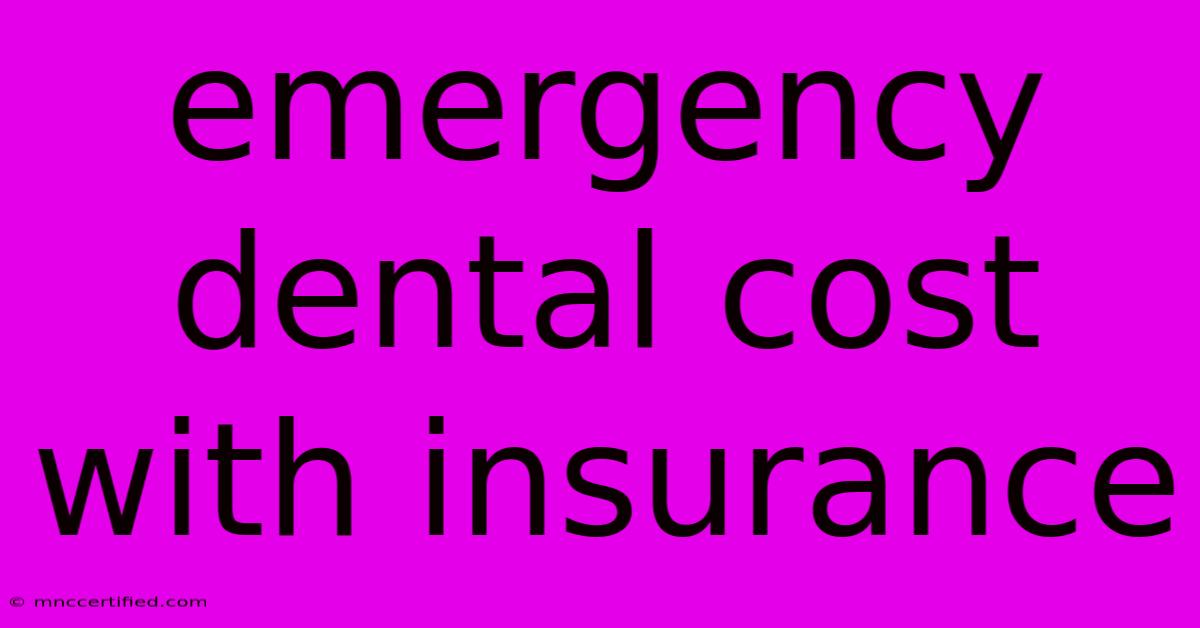Emergency Dental Cost With Insurance

Table of Contents
Emergency Dental Costs: What to Expect with Insurance
Dental emergencies can strike at any time, leaving you with a throbbing toothache, a chipped tooth, or a knocked-out crown. The last thing you want to worry about in these situations is the cost. Fortunately, dental insurance can help alleviate the financial burden, but understanding your coverage is crucial.
What is Covered by Dental Insurance in an Emergency?
Dental insurance plans vary, so it's essential to review your policy carefully to know exactly what's covered. Generally, most plans will cover:
- Emergency Exams: This includes a quick assessment of your situation and immediate pain relief.
- Basic Treatment: This can include extractions, fillings, or temporary crowns to stabilize your tooth.
- Diagnostic Tests: X-rays might be needed to assess the extent of the damage and determine the best treatment plan.
What's Not Typically Covered by Dental Insurance?
Keep in mind that your dental insurance may not cover:
- Cosmetic Procedures: While some plans might cover a small percentage of cosmetic work, they usually won't fully cover procedures like teeth whitening or veneers.
- Pre-Existing Conditions: If you had a pre-existing dental condition, it might not be covered by your insurance.
- Out-of-Network Care: If you visit a dentist outside your network, you'll likely pay a higher out-of-pocket expense.
Understanding Your Dental Insurance Policy: Key Terms
- Deductible: This is the amount you need to pay before your insurance kicks in.
- Co-pay: This is a fixed amount you pay for each service, like an exam or filling.
- Co-insurance: This is a percentage you pay of the total cost of a service, usually after meeting your deductible.
- Maximum Benefit: This is the total amount your insurance will pay for dental care each year.
Tips for Saving Money on Emergency Dental Costs
- Choose an in-network dentist: You'll save money on out-of-pocket expenses.
- Ask about payment plans: Some dentists offer payment plans to make emergency care more affordable.
- Consider a dental savings plan: If you don't have dental insurance, a dental savings plan can help you save money on dental care.
- Practice good oral hygiene: Preventive care can help prevent dental emergencies in the first place.
What to Do in a Dental Emergency
- Call your dentist: Contact your dentist immediately. They can advise you on how to handle the situation until you can get to the office.
- Seek immediate medical attention: In cases of severe trauma, such as a knocked-out tooth, you should seek immediate medical attention.
- Document everything: Keep records of all costs associated with your emergency care, including your insurance payments.
Final Thoughts
While dental emergencies are unexpected, understanding your insurance coverage and taking proactive steps can make them more manageable financially.
Remember, your dental health is crucial to your overall well-being. Don't delay seeking professional care if you experience a dental emergency.

Thank you for visiting our website wich cover about Emergency Dental Cost With Insurance. We hope the information provided has been useful to you. Feel free to contact us if you have any questions or need further assistance. See you next time and dont miss to bookmark.
Featured Posts
-
Cardinals Dominate Jets Murray Shines In 31 6 Win
Nov 11, 2024
-
Nfl Game Report Vikings 12 Jaguars 7
Nov 11, 2024
-
Brothers Bond Bourbon Signed Bottle
Nov 11, 2024
-
Alliance Insurance Centers Green Bay
Nov 11, 2024
-
Disability Insurance Lawyers Near Me
Nov 11, 2024